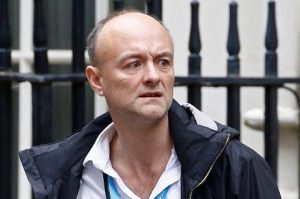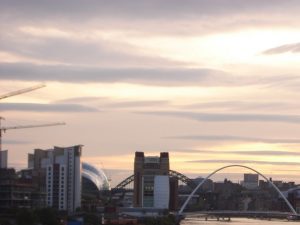
From the Cyprus Mail
Spin doctor Dominic Cummings, the Svengali to Boris Johnson’s Trilby, the Rasputin to Johnson’s Tsarina Alexandra, the organ-grinder to Johnson’s dancing monkey, the puppet-master to Johnson’s, well, puppet, has become Britain’s Most Hated Man.
That’s because everyone in Britain now knows that Cummings didn’t just break the coronavirus-lockdown rules that he himself helped draw up for the population, but pulverised them. The Gollum-like governmental advisor apparently believed that rules exist only for plebs and he, as a superior being, had a divine right to flout them. In late March he drove his wife and child 260 miles from London to his parents’ farm near Durham in northeast England, while his missus was displaying coronavirus symptoms. He developed symptoms soon after. Also, while in the northeast, he drove 30 miles to local tourist attraction Barnard Castle, an action he subsequently justified by claiming he’d done it to check if he could drive safely even though the virus was affecting his eyesight. I guess that’s the equivalent of a brain surgeon performing an operation to check if the palsy he’s been suffering from isn’t making his hands shake too much.
I should say not quite everyone in Britain is baying for Cummings’s blood, for I’ve noticed a few right-wing folks complaining on social media that Cummings has been the victim of a stitch-up by Britain’s hideous lefty mainstream press. Such people regard Cummings as the Messiah, thanks to him being Campaign Director of the Vote Leave movement in 2015-16 and playing a major role in getting Britain out of the European Union. According to them, the lefty newspapers that have it in for poor Dom include that notoriously socialistic organ, the Daily Mail. Looking at the state of the comments posted by those fulminating right-wingers, I just hope they cancel their subscriptions to the Daily Mail and invest the money they’ve saved in taking punctuation courses where they learn how to use apostrophes correctly.
Anyway, reading the screeds of print written about Cummings in the past week, I’ve been reminded that Cummings first made a name for himself during a little-remembered episode in recent British political history. It happened shortly after the advent of the new millennium, in a part of the world where I was living. I’m talking about the referendum on setting up a regional assembly in northeast England, held in 2004.
Soon after Tony Blair’s New Labour government arrived in power in the late 1990s, devolution was implemented in the non-English parts of the United Kingdom, with the creation of the Scottish Parliament, Welsh Senedd and Northern Irish Assembly. This left England as the only part of the UK without devolved government, which caused some awkward anomalies. How, for example, could Scottish, Welsh and Northern Irish politicians turn up at the British parliament and vote on issues affecting the English population, when English politicians weren’t allowed to attend the three devolved parliaments and have a say on equivalent issues affecting the populations there, like health and law enforcement, entrusted to those parliaments under the devolution settlement?
The Regional Assemblies (Preparations) Act of 2003 was meant to restore constitutional balance. It was envisioned that, eventually, eight regional assemblies would operate across England. As England had a population five times the size of that of Scotland, Wales and Northern Ireland combined, a patchwork of small English assemblies would ensure that too much power wasn’t concentrated in a single, huge English assembly. And the first English region to get the chance to approve the establishment of its own assembly was northeast England, which had an all-postal ballot on the matter on November 4th, 2004.
Cynics would say that the northeast was given first say because it seemed highly likely to do what the government wanted it to do. It was deeply pro-Labour at the time and contained Tony Blair’s constituency, Sedgefield. Also, it seemed the English region with the strongest local identity – a place that’d want its own assembly making decisions on its behalf rather than having decisions imposed on it from faraway London. At the time I was living in the northeast’s biggest city, Newcastle-upon-Tyne and, without wishing to confuse the city with the region, I have to say the Geordies of Newcastle did seem a complete race apart.
I’d spent most of my youth in Scotland, where devolution had been a burning political issue for a generation. There’d been a referendum about establishing a Scottish parliament back in 1979 and a majority had voted in favour of it. Due to some disgraceful rule-bending by the Labour government of the time, though, it was decreed that the majority wasn’t big enough and the parliament wasn’t delivered. Soon after came the Conservative government of Margaret Thatcher, which massively reshaped the economy and culture of the UK in the 1980s. Most people in Scotland didn’t vote for Thatcher but the existing constitutional set-up left her free to do what she wanted with the place – a sorry state of affairs that resulted in the nadir of the Poll Tax, imposed solely on Scotland in 1989 as an experiment to see how it was likely to go down in the rest of the UK. A great ‘what-if’ of Scottish political history is how a Scottish parliament, if one had been created at the end of the 1970s, might have stood up to Thatcher. I certainly can’t imagine things being any worse than they were. Anyway, it seemed to me a no-brainer that people in northeast England should get their own assembly in 2004.
However, in the run-up to the referendum, I realised my devolutionary enthusiasm wasn’t mirrored in the Geordies and north-easterners around me. This was largely due to the influence of the anti-assembly campaign North East Says No, chaired by local businessman John Elliot and with a certain Durham-born, Oxford-educated character called Dominic Cummings as one of its prime movers. The anti-assembly campaign whipped up resentment against the proposed establishment. It warned that an assembly would be an unnecessary extra layer of government, diverting yet more public money into the pockets of yet more politicians – and diverting it away from areas that really needed it, like health. “More doctors,” declared one of its ads, “not politicians.” Actually, that sounds familiar. Didn’t Dom peddle a similar message in a more recent political campaign? Although in Newcastle in 2004 I didn’t see it emblazoned on the side of a bus.

From wikipedia.org
It didn’t help the assembly’s cause that the senior politician entrusted with overseeing its creation was deputy Prime Minister John Prescott, who famously had not one but two princely Jaguar motor cars at his beck and call and generally wasn’t known for his frugality.
Cummings’s anti-assembly message certainly got through. With hindsight it was scary how many left-wing, liberal-minded people I knew in Newcastle, who’d normally have detested everything Cummings stood for, unconsciously parroted his rhetoric. I remember in my workplace a Russian woman, who had British citizenship and the right to participate in the referendum but wasn’t too clued-up on local politics, asking a colleague for advice on how to vote. The colleague, a Guardian-reading progressive if ever there was one, promptly told her the assembly was a nonsense and to vote against it. Meanwhile, my best mate in Newcastle, also no right-winger, dismissed the proposed assembly as a ‘white elephant’ designed to ‘line politicians’ pockets’.
It didn’t surprise me, then, when Prescott and company lost the referendum and a majority voted against the assembly’s establishment. It did surprise me how emphatic that majority was – of those who bothered to vote, 78% voted against it. And that wasn’t only the prospect of a north-eastern assembly killed stone dead, but the prospect of any future devolution in England generally. No politician would touch the project after that whipping. Dominic Cummings had secured his first and, alas, not his last big victory.
Although Newcastle is pictured by some as a drunken hellhole where ghastly nightclubs are pillaged by stag and hen parties clad in little more than jockstraps and G-strings while freezing easterly gales howl around them from the North Sea – an image that admittedly isn’t wide of the mark if you venture into the city’s Bigg Market district on a Friday or Saturday night – I thought it was a great city. I thoroughly enjoyed my time there during the first half of the noughties. It had some great pubs (away from the Bigg Market), a good live music scene, decent shops and easy access to libraries and galleries. You could generally find whatever it was that floated your boat, be it antiques markets or creative writing groups or comedy shows or whatever. And I loved how you were mere minutes away from some of the most scenic landscapes in England. And the Geordies were great company. Indeed, I would have stayed for longer if the money I was earning in my job there hadn’t been so crap.
Looking back, though, I was probably lucky that I left Newcastle when I did and avoided the years of austerity that were inflicted on it by David Cameron and Nick Clegg’s Conservative-Liberal Democrat coalition from 2010 onwards. The newspaper reports I’ve read about what happened to Newcastle make grim reading – slabs of money hacked off its budget every year, a total of some 300 million pounds lost by 2019, with a resulting cull of libraries, youth clubs and children’s centres and a general neglect of public services. Even the city’s lollipop men and ladies weren’t spared – their numbers declined from 64 to seven in the space of five years. Would a north-eastern assembly have been able to protect the city against some of this savagery? Like the hypothetical 1980s Scottish parliament and Margaret Thatcher, I doubt if it would have made things any worse.

Incidentally, I think the missed opportunity of the English regional assemblies will contribute eventually to the breakup of the United Kingdom. Occasional senior Labour politicians – Gordon Brown especially – still talk up the prospect of a federal UK as a way to keep Scotland British. With their parliament nestling amid a bunch of similar-sized English ones where power is equally distributed, the Scots, the theory goes, will neither feel neglected nor get ideas above their station. They’ll accept they’re fairly treated and accept their lot as happy Brits. That might be true in an alternative universe, but it isn’t going to happen in this universe. There won’t be a properly federal UK because people in England, as 2004 proved, aren’t interested. And with so much power entrusted to dolts like Boris Johnson in London, I can’t see the Scots putting up with the existing constitutional status quo for much longer.
Modern right-wingers adore Dominic Cummings for what he’s supposedly done to restore British sovereignty. But he’s actually done more than most to crock the whole concept of Britain. Thanks in part to his exploits, including those in 2004, Britain as a union of four nations is doomed. Dom-ed, in fact.
